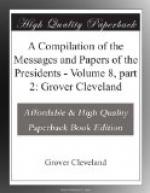The principal treaty, of which the ratifications were exchanged August 16, 1859, recites that “the United States of America and the Ta Tsing Empire, desiring to maintain firm, lasting, and sincere friendship, have resolved to renew, in a manner clear and positive, by means of a treaty or general convention of peace, amity, and commerce, the rules which shall in future be mutually observed in the intercourse of their respective countries,” and proceeds in its thirty articles to lay out a careful and comprehensive system for the commercial relations of our people with China. The main substance of all the provisions of this treaty is to define and secure the rights of our people in respect of access to, residence and protection in, and trade with China. The actual provisions in our favor in these respects were framed to be, and have been found to be, adequate and appropriate to the interests of our commerce, and by the concluding article we receive the important guaranty that—
Should at any time the Ta Tsing Empire grant to any nation, or the merchants or citizens of any nation, any right, privilege, or favor, connected either with navigation, commerce, political or other intercourse, which is not conferred by this treaty, such right, privilege, and favor shall at once freely inure to the benefit of the United States, its public officers, merchants, and citizens.
Against this body of stipulations in our favor and this permanent engagement of equality in respect of all future concessions to foreign nations the general promise of permanent peace and good offices on our part seems to be the only equivalent. For this the first article undertakes as follows:
There shall be, as there have always been, peace and friendship between the United States of America and the Ta Tsing Empire, and between their people respectively. They shall not insult or oppress each other for any trifling cause, so as to produce an estrangement between them; and if any other nation should act unjustly or oppressively, the United States will exert their good offices, on being informed of the case, to bring about an amicable arrangement of the question, thus showing their friendly feelings.
At the date of the negotiation of this treaty our Pacific possessions had attracted a considerable Chinese emigration, and the advantages and the inconveniences felt or feared therefrom had become more or less manifest; but they dictated no stipulations on the subject to be incorporated in the treaty. The year 1868 was marked by the striking event of a spontaneous embassy from the Chinese Empire, headed by an American citizen, Anson Burlingame, who had relinquished his diplomatic representation of his own country in China to assume that of the Chinese Empire to the United States and the European nations. By this time the facts of the Chinese immigration and its nature and influences, present and prospective, had become




